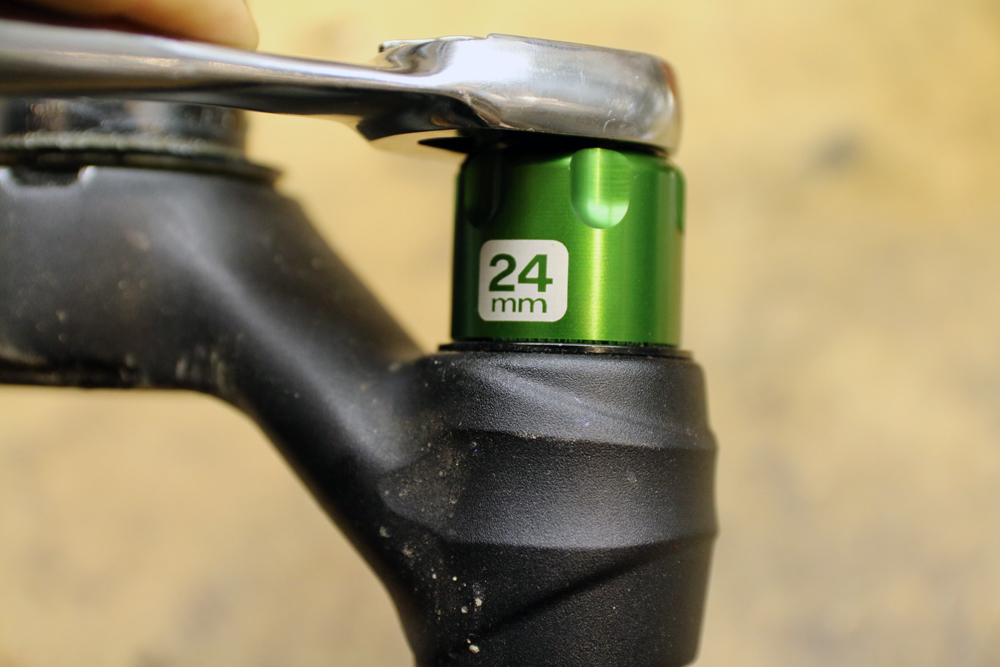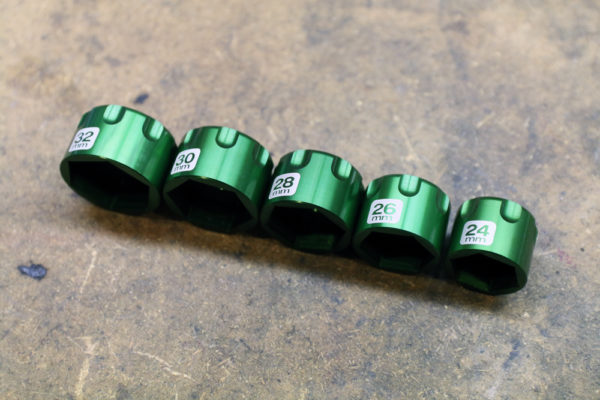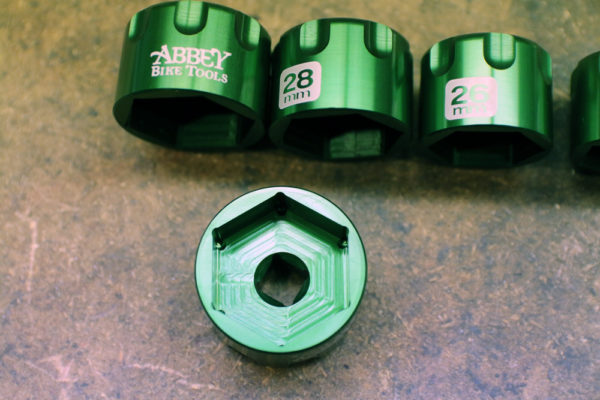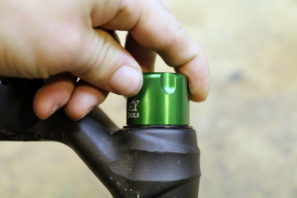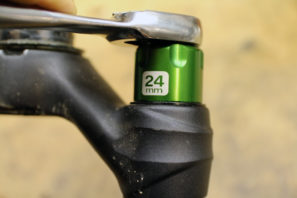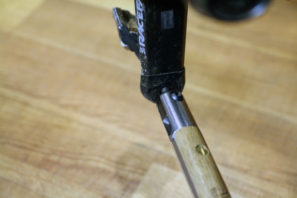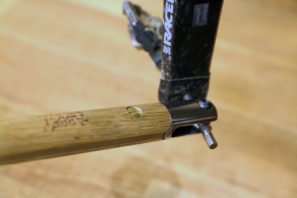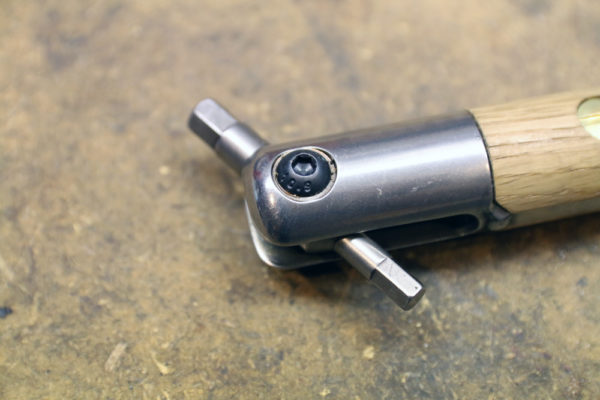Realistically, unless you work on a lot of suspension forks, special top cap sockets probably aren’t high on your high on your list. Even if you do crack open a fork every so often, you may not even know that such a thing even exists. For years, better mechanics have been buying customized sockets – or grinding them down on their own. Standard sockets have a tendency to slip off the shallow wrench flats of suspension top caps thanks to the chamfer that is usually included. Making the surface of the socket as flat as possible provides more grip, and less chance of damaging that pricey suspension fork.
So after years of mechanics going it alone, why did Abbey Bike Tools create their own set of sockets? As usual, Jason Quade thought it could be done better…
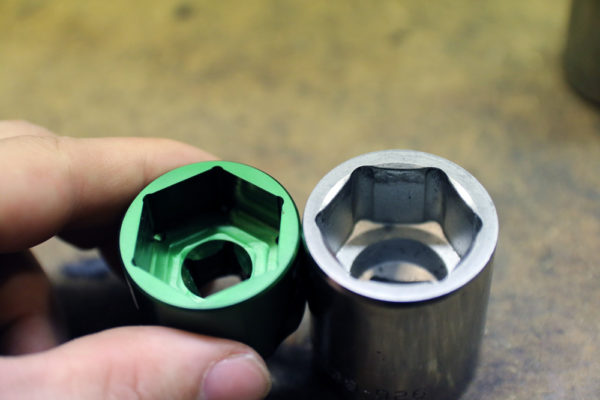
Right off the bat, the Abbey sockets are clearly different. Machined from billet aluminum rather than steel, the sockets easily survive the relatively low torque of suspension top caps and have less chance of damaging them. Even compared to the custom Armstrong sockets that used to reside in my suspension tool box, the Abbey sockets have more contact area with zero lead in. When you’re underneath your car in the dark, the lead in on traditional sockets makes it easier for the socket to settle onto the nut or bolt. In this case precision is more important than convenience which is why the chamfer-less sockets are a sure thing.
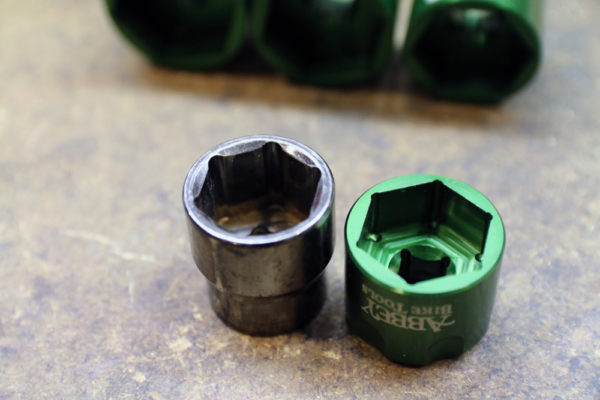
Adding a bit more functionality, the sockets include finger splines that make it much easier to turn, even with oil covering your fingers. Otherwise, it’s a 3/8″ square drive for use with standard ratchets and torque wrenches. You can also see compared to the standard sockets that the Abbey tools are shorter which makes it easier to keep it from slipping off the top cap.
In the end, if you’re considering a socket for work on suspension, there’s really no reason not to buy the Abbey sockets – especially now that they will be offered for sale individually. Previously, they have only been available as a complete set of 5 at $150 (32, 30, 28, 26, and 24mm). It’s great to be prepared, but since I’ve had them I’ve only used the 24 and 26mm sockets. Now that they’ll be available for sale individually at $35 ($30 if you pre-order them before September 30th), it makes them less expensive than those custom ground Armstrong sockets I bought years ago. At this point, I’ve used the 24mm socket on a number of forks and it still looks brand new. The difference between the Abbey sockets and a standard socket is night and day, and your suspension top caps will thank you.
Something far more useful for almost every rider? A pedal wrench. Specifically, a $130, Rolls-Royce of a pedal wrench with American White Oak handles, and typical Abbey beauty. The best thing this pedal wrench has going (aside from how good it feels in your hand) is the fact that it includes a 15mm box end wrench as well as 6 and 8mm allen wrenches to fit just about every pedal out there. If you are often changing pedals, the convenience can not be over looked. Can’t remember whether that pedal is 6 or 8mm? Doesn’t matter. The BBQ Pedal wrench has you covered.
Now, is it perfect? Not quite. For the price we’d like to see a bit more refinement out of the swivel attachment for the allen bits. The idea is that it makes it easy to position the wrench at 90 degrees to the crank to easily break the pedal free, and then straighten it out for quick removal. In practice this works great, it just seems like the swivel could be more precise, or better yet, lightly indexed so the bit would stay in place when you’re trying to locate the tool, but still easily movable. You can tighten the allen bolts on the side to make the allen bits harder to rotate, but it seems to make them bind. It’s a small criticism, but for a premium product there is still room for improvement.
Does that change my opinion on the BBQ wrench? Not really. This has become my go-to pedal wrench simply due to the convenience of never having the wrong wrench, and just how good it feels in your hand.
